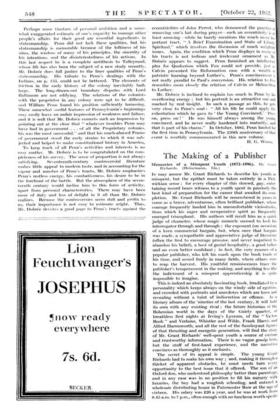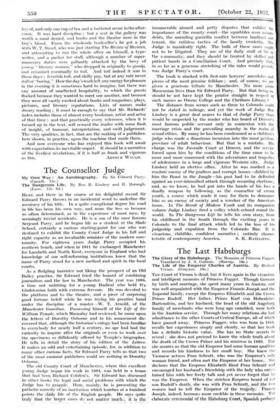The Making of a Publisher
IT may amuse Mr. Grant Richards to describe his youth as misspent, but the epithet must be taken entirely in a Pick-. wickian sense ; for every chapter of this shrewd, gay, enter- taining record bears witness to a youth spent in precisely the best kind of preparation for the career that awaited its com- pletion. Mr. Grant Richards will be remembered in years to come as a brave, adventurous, often brilliant publisher, whose courage frequently landed him in uncomfortable vicissitudes, from which his eager and recuperative spirit as frequently- emerged triumphant. His authors will recall him as a quick judge of character, whose magic monocle seemed to look his interrogator through and through ; the exponent (on occasion) of a keen commercial bargain, but, when once that bargain was made, a sympathetic and appreciative judge of literature (often the first to encourage promise, and never impatient to abandon his belief), a host of genial hospitality, a good talker and an even better confidant ; in fact, the very essence of a popular publisher, who left his mark upon the book trade of his time, and sowed freely in many fields, where others were to reap the harvest. His youthful reminiscences trace the publisher's temperament in the making, and anything less like the indictment of a misspent apprenticeship it is quite
impossible to imagine. •
This is indeed an absolutely fascinating book, irradiated by a personality which keeps always on the windy side of egotism. and crowded with portraits and anecdotes which are keen and revealing without a taint of indiscretion or offence. As a literary album of the 'nineties of the last century, it will hold its own with any existing rival ; the future historian of the Bohemian world in the days of the Gaiety quartet, of breathless first nights at Irving's Lyceum, of the " Ye low Book " and Verlaine, Whistler and Wilde, Frank Harris and Alfred Harmsworth, and all the rest of the flamboyant figures of that thrusting and energetic generation, will find the story of Mr. Grant Richards' well-spent youth a source of curious and trustworthy information. There is no vague gossip here, but the stuff of first-hand experience, and the narrative convinces as thoroughly as it enchants. . •
The secret of its appeal is simple. The young Grant Richards had to make his own way ; and, making it through a thicket of apparent obstacles, he must needs turn every opportunity to the best issue that it offered. The'Son of an Oxford don, who understood philosophy better than parentage, and in any case was in no position to fill his nursery with luxuries, the boy had a roughish schooling, and entered a wholesale distributing house in Patermister Row at the age of sixteen. His salary was £20 a year, and he was at work from 8.45 a.m. to 7 p.m., often enough with no luncheon worth speak'
ing of, and only one cup of tea and a buttered scone in the after- noon. It was hard discipline ; but a seat in the gallery.was worth a meal denied, and books and the theatre were in the boy's blood. From the wholesale bookseller's he got a job vfith W. T. Stead, who was just starting The Review of Reviews, and attempting to run the whole office on himself, a type- writer, and a packer for staff, although a number of super- numerary duties were gallantly attacked by the bevy of young " literary women," who dropped in originally to gossip, and remained eventually to toil. And toil indeed it was in those days ; feverish toil, and chilly pay, but at any rate never dull or "boring." How the day's work left any energy for pleasure in the evening it is sometimes hard to imagine, but there was any amount of unaffected hospitality, to which the guests flocked because they wanted to meet one another, and because they were all vastly excited about books and magazines, plays, pictures, and literary reputations. Lists of names make dreary reading ; it must be enough to say that Mr. Richards' index includes those of almost every bookman, artist and actor of that time ; and that practically every reference, when it is turned up in the text, will reward the reader with some flash of insight, of humour, interpretation, and swift judgement. The very qualities, in fact, that are the making of a publisher, here shown, in practice, upon the machine that made them.
And now everyone who has enjoyed this book will await with expectation its inevitable sequel. It should be a narrative of the liveliest revelations, if it is half as frank and vigorous















































 Previous page
Previous page